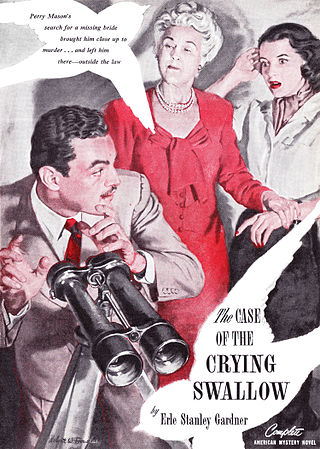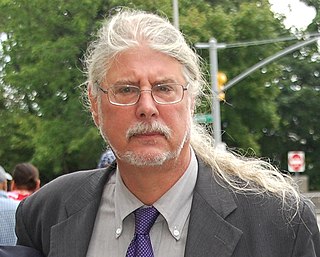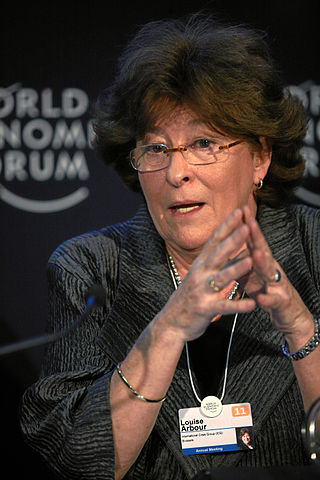Related Research Articles

Perry Mason is a fictional character, an American criminal defense lawyer who is the main character in works of detective fiction written by Erle Stanley Gardner. Perry Mason features in 82 novels and four short stories, all of which involve a client being charged with murder, usually involving a preliminary hearing or jury trial. Typically, Mason establishes his client's innocence by finding the real murderer. The character was inspired by famed Los Angeles criminal defense attorney Earl Rogers.
Legal ethics are principles of conduct that members of the legal profession are expected to observe in their practice. They are an outgrowth of the development of the legal profession itself.

Ronald L. Kuby is an American criminal defense and civil rights lawyer, radio talk show host, and television commentator. He has hosted radio programs on WABC Radio in New York City and Air America radio.

Arthur Raphael Miller, is an American legal scholar in the field of American civil procedure and a University Professor at New York University and Chairman of The NYU Sports & Society Program. He was a professor at Harvard Law School from 1971 to 2007.
Dorchen A. Leidholdt is an activist and leader in the feminist movement against violence against women. Since the mid-1970s, she has counseled and advocated for rape victims, organized against "the media's promotion of violence against women", served on the legal team for the plaintiff in a precedent-setting sexual harassment case, founded an international non-governmental organization fighting prostitution and trafficking in women and children, directed the nation's largest legal services program for victims of domestic violence, advocated for the enactment and implementation of laws that further the rights of abused women, and represented hundreds of women victimized by intimate partner violence, human trafficking, sexual assault, the threat of honor killing, female genital mutilation, forced and child marriage, and the internet bride trade.

David Feige is an American lawyer, legal commentator, and author. He is the author of the memoir, Indefensible: One Lawyer's Journey into the Inferno of American Justice, and co-creator of the TNT legal drama Raising the Bar, both of which center on the life of the public defender. He is also the co-founder and board chair of The Bronx Freedom Fund, a charitable bail organization in New York State. In 2016 he won the Albert Maysles New Documentary Director Award for "Untouchable" a documentary feature he wrote, produced and directed. The film premiered at the Tribeca Film Festival.
A.L. Alexander's Mediation Board is a 1940s radio program in which private citizens with personal problems received advice from a panel of educators and sociologists.
The Washington State Bar Association (WSBA) is the state bar association of the U.S. state of Washington. It operates under the delegated authority of the Washington Supreme Court to license the state's nearly 41,000 active and inactive lawyers and other legal professionals. The WSBA's mission is to serve the public and the members of the Bar, to ensure the integrity of the legal profession, and to champion justice.
Bates v. State Bar of Arizona, 433 U.S. 350 (1977), was a United States Supreme Court case in which the Court upheld the right of lawyers to advertise their services. In holding that lawyer advertising was commercial speech entitled to protection under the First Amendment, the Court upset the tradition against advertising by lawyers, rejecting it as an antiquated rule of etiquette.

The Judiciary of New York is the judicial branch of the Government of New York, comprising all the courts of the State of New York.
Legal aid in the United States is the provision of assistance to people who are unable to afford legal representation and access to the court system in the United States. In the US, legal aid provisions are different for criminal law and civil law. Criminal legal aid with legal representation is guaranteed to defendants under criminal prosecution who cannot afford to hire an attorney. Civil legal aid is not guaranteed under federal law, but is provided by a variety of public interest law firms and community legal clinics for free or at reduced cost. Other forms of civil legal aid are available through federally-funded legal services, pro bono lawyers, and private volunteers.
In the United States, advertising of services by members of the profession of law is typically permitted but regulated by state court and bar association rules.
A court show is a broadcast programming genre comprising legal dramas and reality legal programming. Court shows present content mainly in the form of legal hearings between plaintiffs and defendants, presided over in one of two formats: scripted/improvised with an actor portraying a judge; or, an arbitration-based reality format with the case handled by an adjudicator who was formerly a judge or attorney.
The New York County Lawyers Association (NYCLA) is a bar association located in New York City.
Public interest law refers to legal practices undertaken to help poor, marginalized, or under-represented people, or to effect change in social policies in the public interest, on 'not for profit' terms, often in the fields of civil rights, civil liberties, religious liberty, human rights, women's rights, consumer rights, environmental protection, and so on.
The Alaska Bar Association (ABA) is a mandatory bar association responsible for the Alaska Supreme Court and for the admission and discipline process of attorneys for the state of Alaska.

Lauren Laniece Lake is an American family lawyer, television judge, and talk show presenter.

Women in law describes the role played by women in the legal profession and related occupations, which includes lawyers, paralegals, prosecutors, judges, legal scholars, law professors and law school deans.
The Court of Human Relations is an American old-time radio human-interest program, pioneering the popular judicial genre that would later transform into televised entertainment. It was broadcast on NBC, CBS, and Mutual at various times, beginning January 1, 1934, and ending January 1, 1939. Sometimes referred to as True Story Court of Human Relations, not only was it radio's first courtroom series, but it was "one of the first sponsored programs ever carried on CBS."

The Multnomah Bar Association (MBA) is a voluntary bar association located in Portland, Oregon. The organization is also sometimes referred to as the Multnomah County Bar Association. Although named after Multnomah County membership in the association is open to all lawyers in the State of Oregon. The present MBA was founded in 1906. There was an earlier group of attorneys, also called the Multnomah Bar Association, which appears to have dissolved some time in the early 1900s.
References
- 1 2 Dunning, John (1998). On the Air: The Encyclopedia of Old-Time Radio (Revised ed.). New York, NY: Oxford University Press. p. 288. ISBN 978-0-19-507678-3 . Retrieved 2024-11-14.
- ↑ "May Drop Good Will Court; Opera Returns To The Air This Month". The Lincoln Star. December 6, 1936. p. CD-10. Retrieved July 12, 2023– via Newspapers.com.
- ↑ "Any Woes Today?," Time, March 8, 1943.
- ↑ Hyatt, Wesley (1997). The Encyclopedia of Daytime Television . Watson-Guptill Publications. p. 106. ISBN 978-0823083152 . Retrieved 22 March 2020.